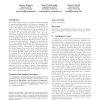Free Online Productivity Tools
i2Speak
i2Symbol
i2OCR
iTex2Img
iWeb2Print
iWeb2Shot
i2Type
iPdf2Split
iPdf2Merge
i2Bopomofo
i2Arabic
i2Style
i2Image
i2PDF
iLatex2Rtf
Sci2ools
150
click to vote
MOBICOM
2006
ACM
2006
ACM
On the complexity of scheduling in wireless networks
We consider the problem of throughput-optimal scheduling in wireless networks subject to interference constraints. We model the interference using a family of K-hop interference models. We define a K-hop interference model as one for which no two links within K hops can successfully transmit at the same time (Note that IEEE 802.11 DCF corresponds to a 2-hop interference model.). For a given K, a throughput-optimal scheduler needs to solve a maximum weighted matching problem subject to the K-hop interference constraints. For K = 1, the resulting problem is the classical Maximum Weighted Matching problem, that can be solved in polynomial time. However, we show that for K > 1, the resulting problems are NP-Hard and cannot be approximated within a factor that grows polynomially with the number of nodes. Interestingly, we show that for specific kinds of graphs, that can be used to model the underlying connectivity graph of a wide range of wireless networks, the resulting problems admi...
Related Content
| Added | 14 Jun 2010 |
| Updated | 14 Jun 2010 |
| Type | Conference |
| Year | 2006 |
| Where | MOBICOM |
| Authors | Gaurav Sharma, Ravi R. Mazumdar, Ness B. Shroff |
Comments (0)

